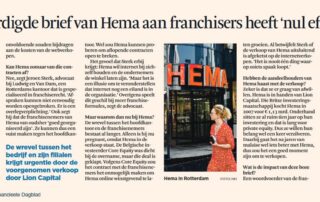Franchisor convicted under the Acquisition Fraud Act
For the first time, a court has ruled, with reference to the Acquisition Fraud Act, that if a franchisee claims that the franchisor has presented an unsatisfactory forecast, the franchisor must prove that the forecast is sound. Our office has represented the interests of the franchisee in court in this regard. The court ruled that the franchisee may appeal to a reversal of the burden of proof pursuant to the Acquisition Fraude Act (Section 6:195(1) of the Dutch Civil Code). This reversal of the burden of proof also applies to situations prior to the introduction of the Acquisition Fraud Act on 1 July 2016, according to the court.
The problem with forecasts that do not materialize is that it is often difficult for franchisees to determine why the expectations raised are not being realised. If a franchisee suspects that a mistake has been made by the franchisor, this will be difficult for the franchisee to prove. Cooperation from the franchisor cannot always be counted on and the franchisor may refuse to divulge trade secrets. The Acquisition Fraud Act came into effect on 1 July 2016 for these and other issues. If there is a sufficiently substantiated argument that there is a case of deception, the burden of proof can be reversed. If the evidence is not successful, the wrongful act can be established.
The court of Zeeland-West-Brabant recently applied the Acquisition Fraud Act for the first time to a forecast issue. The franchisee had accused the franchisor of having acted unlawfully by providing an unsatisfactory forecast. The franchisor was then sentenced to prove that the prognosis had been drawn up properly.
Although the Acquisition Fraud Act entered into force on 1 July 2016, the court ruled in its judgment that the reversal of the burden of proof also applies to forecasts issued before 1 July 2016. The court considered that the legislator did not make any distinction at the time of entry into force in the applicability of the provisions to agreements concluded before or after the entry into force of the law. According to the court, freely translated, this would moreover fit within the legal opinions already applicable in the Netherlands about the franchisor’s duty of care.
mr. AW Dolphijn – Franchise lawyer
Ludwig & Van Dam Franchise attorneys, franchise legal advice. Do you want to respond? Go to dolphijn@ludwigvandam.nl .

Other messages
Late notification that no franchise agreement will be concluded
On April 11, 2017, EQLI:NL:GHARL:2017:3104, the Amsterdam-Leeuwarden Court of Appeal not only assessed the question of whether the negotiations on a franchise agreement to be concluded
Want to get rid of your franchise agreement in the meantime?
Franchise agreements are usually concluded for a longer period of time. How do you break open a franchise agreement?
HEMA in conflict with franchisees about e-commerce agreements
On 18 July 2018, the District Court of Amsterdam, ECLI:NL:RBAMS:2018:5098, rendered a judgment in proceedings on the merits in which the franchisees were largely ruled in favor of e-commerce.
mr. J. Sterk about HEMA conflict in the FD 18 July 2018
mr. J. Sterk about HEMA conflict in the FD.
Column Franchise+ – “Legal Franchise Statistics 2018”
The Legal Franchise Statistics have been compiled for 10 years by Ludwig & Van Dam attorneys on the basis of all published judgments of judges.
Franchisor prohibits opening (franchise) company
A franchisor applied for interim measures to prohibit a franchisee from opening a franchisee's business.






